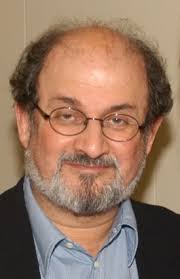For Salman Rushdie, the most truthful stories come from fiction.
Addressing a full crowd Friday in Jesse Auditorium, as the keynote speaker for the second annual Unbound Book Festival, the award-winning writer said that through literature, a reader can learn about the way people live and think in a way that news and official narratives fail to capture.
“Writers often contest the official narratives, so they often get in trouble with powerful people because, in a strange way, the art of fiction becomes the place in which truth gets told,” he said.
Rushdie recounted several stories of powerful figures getting angry with what he wrote, most notably Iran’s former supreme leader, Ayatollah Ruhollah Khomeini, issuing an order calling for Rushdie’s death following the publication of “The Satanic Verses.”
“And as far as ‘The Satanic Verses’ is concerned, and my little dispute with the Ayatollah Khomeini,” Rushdie said to laughter and applause from the crowd, “all I can say is that one of us is dead. You’ve heard about the pen being mightier than the sword — don’t mess with novelists. A message to Pennsylvania Avenue.”
At his speech, Rushdie infused a defense of the power of literature and storytelling with searing polemics against politicians, especially “the five-letter T-word” — President Donald Trump, whose name Rushdie refused to say.
When the Trump administration is actively challenging the nature of truth, Rushdie said, the purpose of literature is to illuminate human nature, which he called “the great constant” across time, language and ideology.
“One of the things that politicians don’t understand is that in the end, they are not the people by whom an age is remembered,” he said. “An age is remembered by its art. What survives of us is poetry. What survives of us is painting, and architecture, and story. If we look back — we only have to look back 50 years, 100 years — we see that time through its artists. That is what artists do in the end. They tell the future what the present was like.”
Rushdie’s talk Friday was the first event of the weekend’s Unbound Book Festival, which brought 38 authors to Columbia for the weekend, including Sierra Leonean writer Ishmael Beah, memoirist Julie Barton and young-adult fiction author Zac Brewer.
The festival’s events continued Saturday with panel discussions, author conversations and poetry readings all day at various venues at Stephens College. Some events, including a conversation between author Rachel Hall, who wrote about the Holocaust, and Palestinian-American memoirist and poet Ibtisam Barakat, were standing-room only.
Concluding his speech Friday night, Rushdie said that the job of the artist is to expand the frontiers of our knowledge and senses of ourselves.
“Great art tries to open the universe,” he said. “Tries to push back the borders of our understanding, and just to increase by some tiny amount — or some large amount, depending on the genius of the artist — the sum total of what it is possible for us to understand, to perceive, to know and, therefore, finally, to be.”
_Edited by George Roberson | [email protected]_








